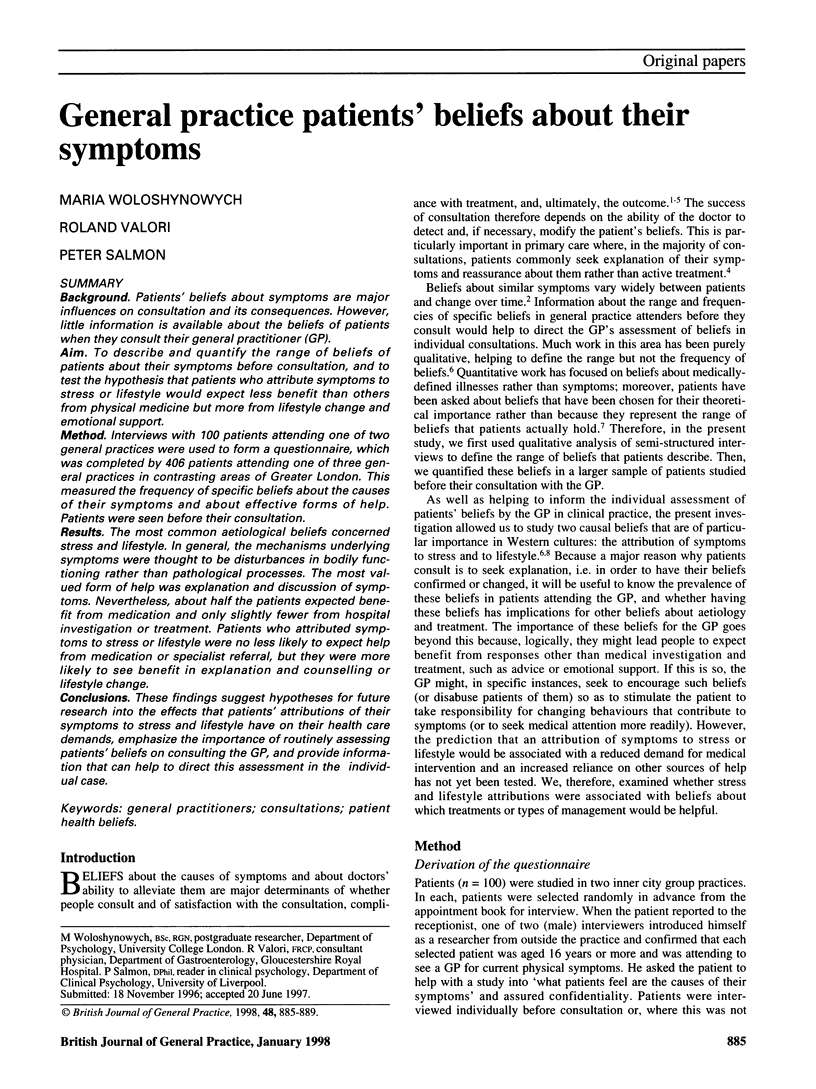Abstract
BACKGROUND: Patients' beliefs about symptoms are major influences on consultation and its consequences. However, little information is available about the beliefs of patients when they consult their general practitioner (GP). AIM: To describe and quantify the range of beliefs of patients about their symptoms before consultation, and to test the hypothesis that patients who attribute symptoms to stress or lifestyle would expect less benefit than others from physical medicine but more from lifestyle change and emotional support. METHOD: Interviews with 100 patients attending one of two general practices were used to form a questionnaire, which was completed by 406 patients attending one of three general practices in contrasting areas of Greater London. This measured the frequency of specific beliefs about the causes of their symptoms and about effective forms of help. Patients were seen before their consultation. RESULTS: The most common aetiological beliefs concerned stress and lifestyle. In general, the mechanisms underlying symptoms were thought to be disturbances in bodily functioning rather than pathological processes. The most valued form of help was explanation and discussion of symptoms. Nevertheless, about half the patients expected benefit from medication and only slightly fewer from hospital investigation or treatment. Patients who attributed symptoms to stress or lifestyle were no less likely to expect help from medication or specialist referral, but they were more likely to see benefit in explanation and counselling or lifestyle change. CONCLUSIONS: These findings suggest hypotheses for future research into the effects that patients' attributions of their symptoms to stress and lifestyle have on their health care demands, emphasize the importance of routinely assessing patients' beliefs on consulting the GP, and provide information that can help to direct this assessment in the individual case.
Full text
PDF




Selected References
These references are in PubMed. This may not be the complete list of references from this article.
- Becker M. H., Maiman L. A. Sociobehavioral determinants of compliance with health and medical care recommendations. Med Care. 1975 Jan;13(1):10–24. doi: 10.1097/00005650-197501000-00002. [DOI] [PubMed] [Google Scholar]
- Brownell K. D. Personal responsibility and control over our bodies: when expectation exceeds reality. Health Psychol. 1991;10(5):303–310. doi: 10.1037//0278-6133.10.5.303. [DOI] [PubMed] [Google Scholar]
- Helman C. G. 'Tonic', 'fuel' and 'food': social and symbolic aspects of the long-term use of psychotropic drugs. Soc Sci Med B. 1981 Oct;15(4):521–533. doi: 10.1016/0160-7987(81)90026-0. [DOI] [PubMed] [Google Scholar]
- Helman C. G. Limits of biomedical explanation. Lancet. 1991 May 4;337(8749):1080–1083. doi: 10.1016/0140-6736(91)91720-f. [DOI] [PubMed] [Google Scholar]
- Hunt L. M., Jordan B., Irwin S. Views of what's wrong: diagnosis and patients' concepts of illness. Soc Sci Med. 1989;28(9):945–956. doi: 10.1016/0277-9536(89)90324-9. [DOI] [PubMed] [Google Scholar]
- Webb S., Lloyd M. Prescribing and referral in general practice: a study of patients' expectations and doctors' actions. Br J Gen Pract. 1994 Apr;44(381):165–169. [PMC free article] [PubMed] [Google Scholar]
- Wilson A., Hickie I., Lloyd A., Hadzi-Pavlovic D., Boughton C., Dwyer J., Wakefield D. Longitudinal study of outcome of chronic fatigue syndrome. BMJ. 1994 Mar 19;308(6931):756–759. doi: 10.1136/bmj.308.6931.756. [DOI] [PMC free article] [PubMed] [Google Scholar]
- van de Kar A., Knottnerus A., Meertens R., Dubois V., Kok G. Why do patients consult the general practitioner? Determinants of their decision. Br J Gen Pract. 1992 Aug;42(361):313–316. [PMC free article] [PubMed] [Google Scholar]


